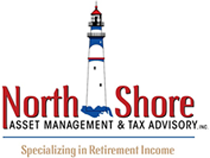Tax Preparation
Tax Preparation
Most financial firms will tell you they do not and should not give tax advice in addition to investment advice. At North Shore Asset Management & Tax Advisory, Inc., we can do this. We have a tax practice; the actual preparation is being done by a local CPA firm that we’ve become affiliated with here in Libertyville. I thought that a full time CPA firm should be doing that particular part of our service that we offer. We do however spend more time on tax planning, especially in connection with retirement income and being the most tax efficient when it comes to investing and the production of income. Tax preparation used to be pretty easy, go to the library and get some forms and do taxes yourself or go to a storefront firm and for very little money have them do it. But today with the IRS getting involved in medical care, stimulus payments and the tracking thereof various complex tax credits for childcare, education, earned income tax credit and others, we thought the best thing would be to have a full-service firm take care of the preparation side for the coming years. We also encounter people that generate large amounts of taxable interest income even with very low interest rates, we find people that are paying significant income taxes on taxable interest when in fact they don’t really need the money. They don’t live on the money; they just earn the interest because they’re used to having money in banks. I am by no means suggesting people sever their bank relationships but for storing large amounts of cash unless there is an earmarked purchase in the future for the money, it’s possible to have safety but have the interest accumulate on a tax deferred basis thereby removing it from the income tax return. Then you would have earnings on your money, in other words interest, you would also have interest on the interest, a compounding effect and also interest on the money you would have paid in taxes. That gives you the best opportunity for growth especially in terms of inflation today. The current inflation situation is literally chopping down the value of fixed savings accounts and money market funds while the interest is microscopic and percentage so far, the after tax and after inflation real return is upsetting to say the least. The value of deposits of this nature become lower and lower unless something is done.
There are four general tax strategies that can be implemented in a variety of way.
They are: deduct, defer, divert and convert.
- Deduct – taking advantage of all available deductions and credits.
- Defer – Use tax deferred vehicles to eliminate tax on interest and other income you do not currently need.
- Divert – possible redirection of income to other in a lower tax bracket.
- Convert – possible conversion of ordinary income to capital gains or taxable investment income to tax-free income.
In addition, there is considerable confusion about the taxation of trusts. Trust vary but the rate of income tax can be much higher than individual tax rates. This is a function of the source of the income and the way trust income is passed to the beneficiaries. A client with a revocable living trust during a lifetime would include income reported to his/her Social Security number in an account in trust name and pay normal individual tax.
After death, the trustee must obtain a tax I.D. number or “EIN” number and the income is reported to that number. Care must be taken to adhere to the terms of the trust and the method by which to distribute income and/or assets to beneficiaries. Certainly, a tax advisor can be a most important relationship.
If your income tax situation involves a small business, rental properties, ownership and partnerships, and other investments that might not be traditional in nature, you would see various tax reporting forms. Such as 1099’s, forms K-1, and other types of tax reporting. Brokerage accounts often have consolidating tax reporting forms, which become very helpful in tax preparation. Those consolidating statements would include dividends earned, interest earned, foreign tax credits and other benefits, and transactions certainly, showing sales and purchases. And if there are sales, showing the proceeds received, and the cost basis for those assets purchased and sold.
A number of clients have come to us after trying to do their tax return on their own, or even using a leading software provider, and when they find themselves missing forms such as the Health Care Certification form that people receive when they have health insurance, that their returns when they try to file them are blocked, and they have to take another route to either upload that form if they can find it, or go to a tax professional to clear the matter up.
We find people that are filing taxes for their parents, and others that are caring for elderly friends or family members, that they cannot come into a tax office. They are often in a situation where they cannot leave their home, but must get their taxes done. A further need for having a tax professional do those tax returns.
There are several people that don’t have enough income to justify filing a tax return, but many of those people should file anyway so that they can claim a credit for things like stimulus payment they did not receive, or other benefits. They would have to file in order to receive. The filing process would include bank information normally for refunds via direct deposit. The government needs to have that information so that future stimulus payments can be paid.
Finally, tax planning involves the assessment of all income from all sources. The income that our client needs, and an exploration of ways that taxable income can be converted from ordinary income to capital gains. Perhaps tax deductions are being overlooked.
